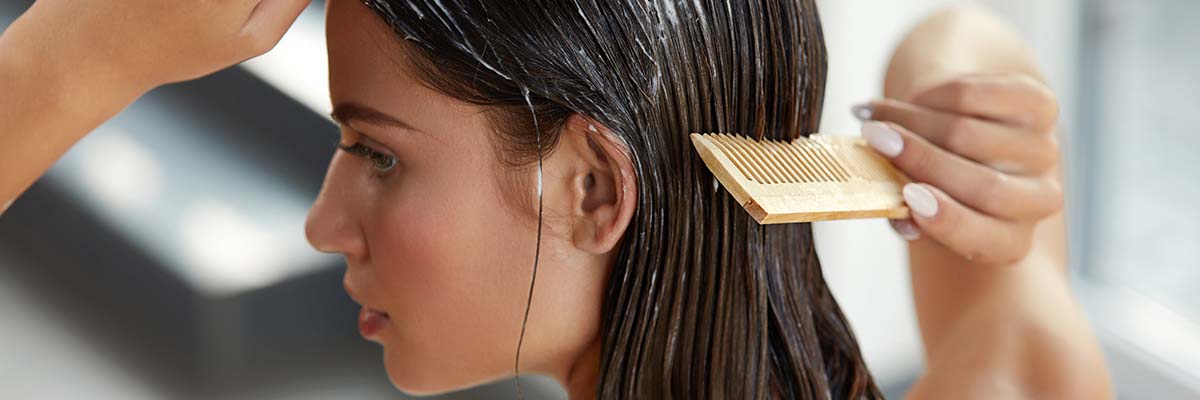Most people only pay attention to their hair strands rather than their scalp, but the truth is that a healthy scalp sets the foundation for healthy hair.
A nourished and clean scalp provides optimal conditions for hair follicles to grow. When the scalp is healthy, it promotes proper blood circulation and ensures that hair follicles receive essential nutrients and oxygen.
A clean and well-maintained scalp is essential for overall scalp hygiene. It helps to prevent the buildup of dirt, oil, and dead skin cells that can clog hair follicles and lead to issues like folliculitis or scalp acne. Good scalp hygiene also reduces the risk of bacterial or fungal infections, such as scalp psoriasis.

General Tips for Scalp Care
Cleanse regularly
Wash your hair and scalp regularly to remove dirt, oil, and product buildup. Use a gentle shampoo that suits your hair type. Focus on massaging it into your scalp and rinse thoroughly to ensure no residue remains.
The right products
Choose hair care products that are suitable for your scalp type and concerns. Look for shampoos, conditioners, and styling products that are free from harsh chemicals, sulphates, and fragrances. These can help avoid scalp irritation and maintain a balanced scalp environment.
Avoid excessive heat styling
Limit the use of heat styling tools such as hairdryers, straighteners, and curling irons. High heat damages the scalp and can lead to dryness and irritation. Allow your hair to air dry or use low heat settings if necessary and always use a heat protectant spray.
Protect your scalp from the sun
Shield your scalp from harmful UV rays by wearing a hat. Sunburn on the scalp can cause dryness, irritation, and damage to the hair follicles.
Go gentle with brushing
Use a wide-toothed comb or a brush with soft bristles to detangle your hair. Start from the ends and gradually work your way up to avoid pulling or tugging on the scalp.
Eat a balanced diet
Nutrients play a significant role in maintaining a healthy scalp. Include foods rich in vitamins A, C, E, and omega-3 fatty acids in your diet to support scalp health.
Minimize stress
Stress can contribute to scalp issues, such as heightened sensitivity or inflammation. Practice stress management techniques like exercise, meditation, or deep breathing exercises.

How Important is Scalp Exfoliation?
Very! Scalp exfoliation makes way for fresh skin and hair follicles to grow healthy hair. If you do not wash, brush, massage or exfoliate your hair regularly then the dead skin cells will build up. Coupled with sweat and our hairs natural oil production, this will lead to an overloaded scalp surface area.
Exfoliating your scalp once or twice a week will help clear built-up scalp debris.
For at home DIY exfoliants look for something consisting of finely ground textures (such as sea salt or sugar,) and apply to a wet scalp. Use small, circular motions with your fingers to gently massage the exfoliant into your scalp – just as you would with a facial exfoliant. Be gentle but thorough and leave for a couple of minutes before rinsing thoroughly.
When using a product look for a scalp scrub or exfoliating shampoo that contains ingredients like salicylic acid, pyrithione zinc, selenium sulphide, or ketoconazole. These ingredients can help remove buildup, slough off dead skin cells, and reduce inflammation on the scalp.
After exfoliating it is a good idea to cleanse your scalp and hair with a gentle shampoo to remove any remaining residue. Follow up with a nourishing conditioner to hydrate and soften your hair and scalp.

When to Avoid Scalp Exfoliation
It is crucial to pay attention to how your scalp reacts to exfoliation and adjust the frequency accordingly. When it comes to exfoliating your scalp, there are certain situations when you should avoid doing so.
Open wounds or cuts
If you have any open wounds or cuts on your scalp, it is essential to avoid exfoliating that area. Exfoliating could irritate the wound, delay the healing process, and potentially introduce bacteria or infection.
Sunburned scalp
If you have a sunburn on your scalp, it is best to avoid exfoliating until your skin has fully healed.
Newly coloured or chemically treated hair
Chemical treatments can make the scalp more sensitive, and exfoliation could potentially cause further irritation. If you have recently coloured your hair or undergone any treatments like keratin treatment, it is recommended to wait for a week or two before exfoliating your scalp.

Ingredients to Avoid for Optimal Scalp Health
Certain ingredients commonly found in hair care products can potentially cause scalps, particularly sensitive scalps to flare up or react. Here are ingredients to be cautious of:
Fragrances
Synthetic fragrances, often listed as "parfum" or "fragrance," can be irritating to sensitive scalps. Look for fragrance-free or naturally scented products.
Sulphates
Sulphates, such as sodium lauryl sulphate (SLS) and sodium laureth sulphate (SLES), are harsh surfactants that can strip the scalp's natural oils and cause dryness and irritation.
Alcohol
High concentrations of alcohol, particularly denatured alcohol, can be drying and irritating to the scalp. Look for alcohol-free products or those with fatty alcohols like cetyl alcohol or stearyl alcohol, which are less drying.
Preservatives
Certain parabens (e.g. methylparaben or propylparaben) can cause allergic reactions and scalp irritations in individuals.
Synthetic dyes
Artificial colorants, like FD&C dyes, can cause scalp sensitivity and irritation in people. Look for products that use natural colorants or are dye-free.
Propylene glycol
This ingredient, commonly found in hair care products, can cause dryness and irritation in sensitive scalps.

Essential oils
Although natural, certain essential oils like peppermint, tea tree, and eucalyptus can be too stimulating and cause sensitivity or allergic reactions in individuals. It is best to patch test or avoid these oils if you have a sensitive scalp.
Most people's scalps can cope with about any product; however, product will work its way down the hair shaft to the scalp therefore certain ingredients can block or suffocate the scalp from breathing. Culprit ingredients include dimethicones and trimethicones, which are added to make hair feel softer, suppler, and more moisturised, but they are molecularly heavy and will block the scalp. Also, noteworthy products like heavy hold sticky gels, mousses or hairsprays with a high alcohol content could cause extreme dryness to the scalp.
Everyone's scalp reacts differently, and what may irritate one person's scalp might not affect another's. If you have a sensitive scalp, it would be beneficial to read product labels, patch test new products, and consult with a dermatologist or healthcare professional for personalized advice.
Repairing the scalp takes time, and it is important to be consistent with a healthy hair care and scalp care routine.


















